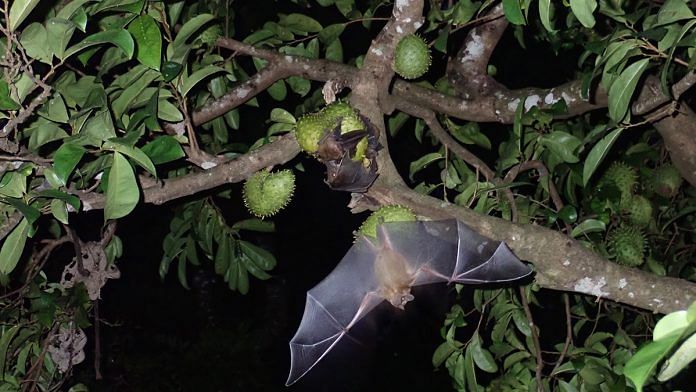New Delhi: A multidisciplinary probe initiated by the Government of India into a research project by a Bengaluru-based government institute — dealing with transmission of pathogens from bats to humans among bat hunters of Nagaland — has reportedly flagged several procedural gaps in the funding of the study and the precautions taken.
According to a report in The Hindu, which has accessed the probe findings, the estimated Rs 1.9 crore funding of the study and the laboratory safety standards under which it was carried out have both been found to be concerning. The study is being carried out by researchers at the National Centre for Biological Science (NCBS), which is a part of the Tata Institute Of Fundamental Research.
“The research publication raised serious concerns as the samples were collected from humans and bats with intent to test for viral pathogens and resulting antibodies of highly infectious pathogens (risk group 4 viruses),” states a health ministry report on the paper, as quoted by the newspaper.
“The study didn’t have the requisite approval of ICMR (Indian Council of Medical Research). Moreover, the facility at NCBS was not equipped in terms of biosafety and biosecurity to undertake such testing,” it adds.
The probe into the study was launched in February 2020, but the findings have not been released in the public domain 15 months since.
When ThePrint reached the ICMR and officials in the Union Ministry of Health Tuesday for a comment, they did not want to talk about the report.
The study in question, which predates Covid, involves an investigation of bat-to-human transmission of deadly viruses — the same mode which is one of the suspects in the case of Covid — in the remote jungles of Nagaland.
Researchers at the NCBS were looking at the transmission of filoviruses — a class of viruses different from the coronavirus, examples include Ebola — from bats to humans among tribals in Nagaland that hunt and eat bats apparently under the belief that they increase virility.
A 2019 paper on the study published in the scientific journal PLOS Neglected Tropical Diseases, had among the co-authors Shi Zhengli of the controversial Wuhan Institute of Virology (WIV), now famous around the world as ‘China’s Bat Lady’.
The WIV is the focus of discussions about Covid being the result of a potential lab leak.
Also Read: Lab leak or natural? How the evidence stacks up in the coronavirus origin investigation
DAE vs health ministry
The Hindu wrote in the report that the probe committee was set up by the ICMR and comprised officials of the Ministries of External Affairs, Defence, Home Affairs, Health, Environment, Law, Departments of Science & Technology, and Development of North Eastern Region.
The NCBS study was partnered by Duke-NUS Medical School in Singapore and the Uniformed Services University of the Health Sciences (USUHS), an institution funded by the US Department of Defense (DoD) and located in Bethesda, Maryland. The study itself is funded by the US Defense Threat Reduction Agency (DTRA), also an agency of the US DoD.
The Hindu reported that differences over the storage of the Nagaland bat samples persist between the Department of Atomic Energy (DAE), and the Union Ministry of Health & Family Welfare.
“The health ministry wants the samples of nucleic acid extract stored at the Bio Safety Level-4 (BSL-4) standard facility at the National Institute of Virology laboratory in Pune, rather than NCBS’s Bengaluru facilities, that are rated BSL-3 at present,” it wrote.
It added: “While the DAE contends that the samples were ‘non-infectious’ and had been checked for the presence of filoviruses (Ebola and Marburg), the Health Ministry contends that such samples must be handled in a laboratory equipped for ‘biosafety and biosecurity conditions’ as otherwise they can pose a ‘significant public health hazard’.”
(Edited by Sunanda Ranjan)
Also Read: How do bats stay safe from the thousands of viruses they host? New study holds some clues



